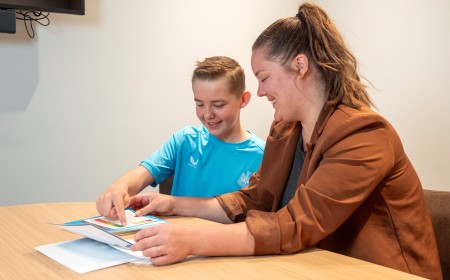Publish date: 23 June 2023
Medical appointment support for people with learning disabilities

A health organisation has created some ‘easy-read’ resources for children with a learning disability, following the success of health cards for adults.
They have been designed to help reduce the fears and anxieties of children with learning disabilities during appointments.
Northumbria Healthcare NHS Foundation Trust has produced a pack of health cards covering a range of procedures.
They contain information about issues such as pain and symptoms, blood pressure, tests and samples, along with weight management and lifestyle advice, in simple text, pictures and colour-coded sections.
The aim of the cards is to help communication with children with learning disabilities so that symptoms, treatment, tests and other advice can be understood and passed on in an easy-to-understand manner.
As well as being used by healthcare professionals during appointments, they can help receptionists and others to gain initial information and they have also been given to community teams to help support patients before they attend their appointments.
Jack Gibson, a 13-year-old from Cramlington, took part in the publicity campaign. He explained why it’s key to improving support, saying: “Children’s health cards are really great, and they’ll help loads of people. It’s going to help kids understand by pictures.
“It could really help because they can show where they’re in pain to really help doctors to know what to do”
Sam Walker, specialist learning disability acute liaison nurse for Northumbria Healthcare, added: “It’s really going to help children understand what’s going on throughout an appointment.
“It’ll help them understand certain procedures like getting bloods taken, putting in cannulas or even trying to explain how they’re in pain. So, it can help both the child and the professional involved.
“The health cards can be used by anyone, but I think it’d be really beneficial for the families themselves as well, to help support their children, to understand procedures, or maybe just help themselves to understand everything that will go on during the whole process of an appointment or emergency attendance.”
More information is available on our dedicated webpage here.
